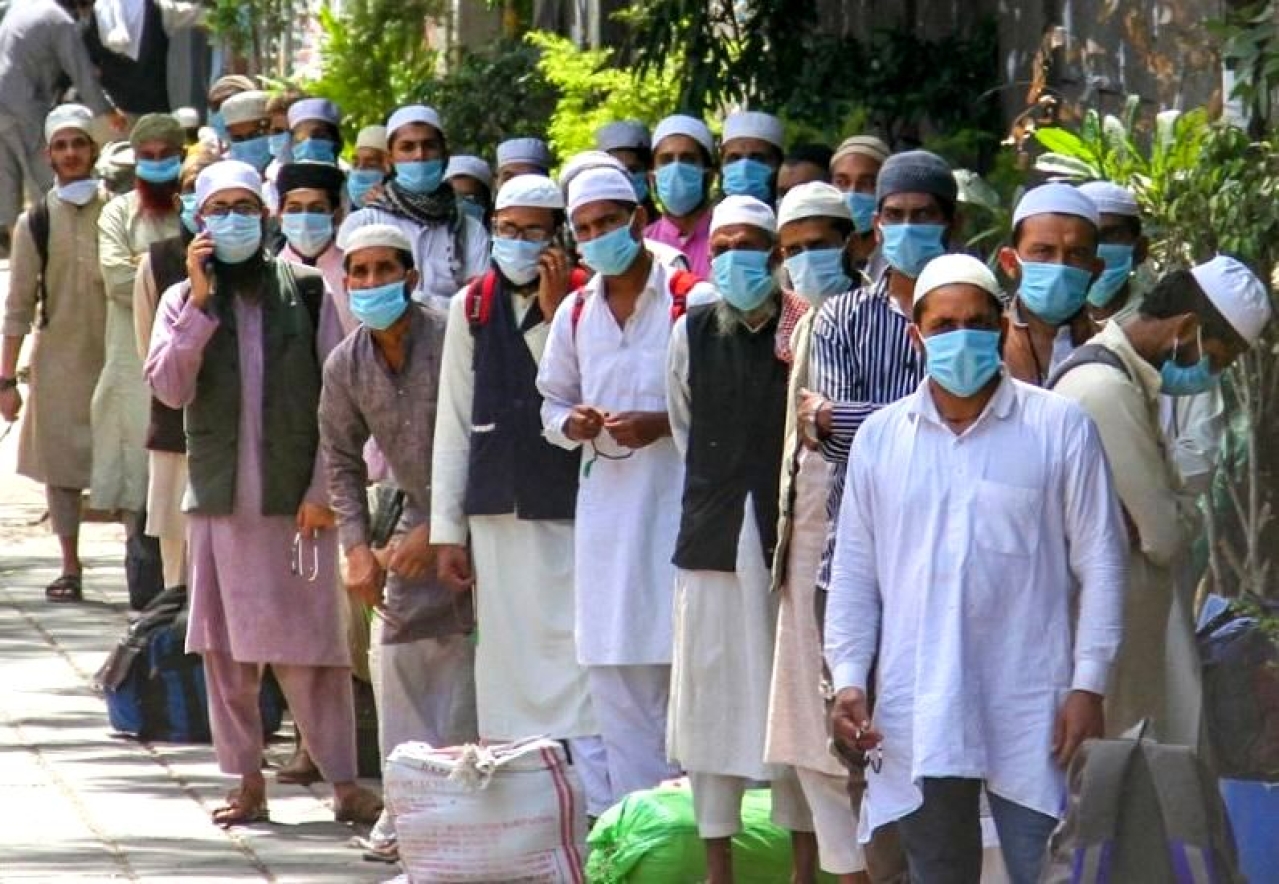
This is not surprising that in India many people are busy defending Tablighi Jamaat’s crime against humanity. What is surprising is that they are oblivious of possible dangers in defending it.
The defence of Tablighis rests on three very spacious arguments. One, that the central government is responsible as they gave the visas to foreigners from countries where coronavirus is spreading. Two, that the Delhi Police knew that so many people are congregating in Tablighi Markaz, they should have vacated the premises. And three, that many other places, particularly temples allowed gatherings till about 16th or 17th March. There was one more defence till yesterday, four, that the people entered Markaz before the government declared lockdown and then they could not go from there. But this last one has collapsed due to Delhi government’s orders of 13th, 16th and 19th March.
One, it is difficult to completely absolve the central government of responsibility to implement the instructions of self-isolation for foreigners and misuse of tourist visa for religious preaching. These preachers have travelled as far as Patana and Jharkhand and have been living there in Mosques. This, simply put, means that the government has been lax in security measures; and it is very grave indeed. And for this it should be criticised. However, this does not absolve the Tablighis from their moral responsibility and failure to inform the police regarding whereabouts of their ‘guests’. The culpability of government can not be used as a defence for the crime of the Tablighis.
Two, the Delhi Police is guilty of handling a hoodwinking organisation with kid-gloves. The 23rd March video released by the SHO shows that the police has been telling them to vacate the premises even before 23rd March. The Tablighis were digging their heels on this or that pretext. (I will talk of the real reason below.) But, again, it is difficult to give the police a clean chit. They should not have been scared of touching this Jamaat and should have done their duty even if that required use of force.
Three, that there were some temples and Hindu gatherings can not be denied. However, they were before the lockdown, and one needs to find out if the states where they occurred had declared a ban on congregations of more than 200 as Delhi government did on 13th March. Since the idea of social distance and fear of coronavirus spread was already known before these events, the concerned organisations (temples etc.) cannot be absolved of moral responsibility. But, again, the culpability of temples does not make what Tablighis did right. In last few years, the argument that “if A made mistake X, then you can not blame B for making the same mistake” is being used too frequently. This is a fallacious argument. We should criticise, and if need be punish, both A and B. Therefore, if there are any other religious places which had such gatherings staying in congested places, they should also be criticised. This can not be an argument for Tablighi Jamaat’s defence, though, can be an argument for criticising the concerned other religious places.
However, at the same time, we have to make a distinction between ‘violating an order because of some constraints or inadvertently’ or violating them deliberately. And this, as we will see further down is an important distinction.
Another very strange argument advanced in this regard is that some events, like Ramanavami gathering and some yagna, were planned. One wonders how planned and then abandoned in the face of government orders can be equated with violating the government orders with impunity. But that is the way some people in this dear country of ours argue day in and day out. And no one points the foolishness of this line of argument to them.
Now let’s try to have a cursory look at the two very grave concerns in this whole episode which not many people are talking about.
One of these concerns emerges from listening to Maulana Saad’s audios. Maulana Saad is head of Tablighi Jamaat and a very respected Islamic scholar. He has millions of followers world over. Imagine an organisation which can host about 10-15 thousand guests every day through out the year in Delhi Markaz. And the Jamaat has many more such palaces, may be a bit smaller but perhaps in dozens. Thus, Maulana Saad is a very powerful and influential religious leader.
This Maulana has been holding congregations in the Markaz, perhaps attended by thousands, and delivering lectures right till 26th March morning. In these lectures the Maulana argues in many ways and in great detail that:
- In these days of coronavirus threat leaving Mosques is against the hadith (he quotes one).
- This is the time to congregate more in the Mosques. To bring people more into the mosques. The torments like illnesses come because of leaving ibadat, and it will go away only by coming more to the mosques for ibaadat.
“yah mauka kaam ko badhaane ka hai. Yah waqt is ka ki gast karke logon ko masjid ki taraf lane ka hai. Jo azaab gunahon ki wajah se aa rahe hain ve azaab ibaadat ko chhodane se khatm nahin honge, balki ibadaat ki nirdat(?) ko badhaane se khatam honge.”
The Maulana repeats this argument and message in many videos tracks and in many ways. I found the video of 26th March morning (?) (after Fajr) most instructive. It is very long (1:54:57) and like all religious discourses very repetitive. But explains the Maulana’s views great clarity. In this video the Maulana explains the importance of “imaan” (faith) and “ilm” in great detail. At the end comes to the conclusion that imaan and ilm dictate that namaaz should be offered in the mosques and the message of Islam should be given to people by personally visiting them. No other considerations come in the ways of those who have imaan and ilm in these duties. Which means he is not only preaching to live in close proximity with each other, to pay in large congregations; but also, to visit people during the lockdown. One can say that these are his religious views and he has the freedom of expressing as well as trying to convince others to accept them. The problem is that these religious views endanger lives of thousands of people, and are capable of creating a very large-scale health hazard.
This theology and asking people to stick to these duties ‘come what may’ makes the Tablighi act of congregation very different from other acts of congregation either because of lack of facilities to vacate the premises or because of some religious stupidity for a day or two. If the people stuck in a yatra or a Gurudwara and could not disperse, it may have been for various reasons. It can be equated with the Tablighi congregations only if there is evidence of deliberate theological support, deliberate staying together and deliberate instigating people not to obey the government orders. I am not saying that there have not been any such ‘theologically minded’ deliberate acts of instigating people to disobey the government orders. All I am saying is, we should not equate acts of ‘being stuck’ with ‘acts of theological disregard’ of the orders. If there are such preachings of the temple priests and Mahants they should be equally condemned and punished. But if there are no such acts then the false analogy can not be used to defend the Jamaat.
The real concern in this is: that an interpretation of a religion is being preached that clearly declares that when there is a conflict between a government order and supposed to be religious duty a large section of believers will go by the supposed to be religious duty and disobey the government order. This attitude is very dangerous and can break the law and order any time. The issue is, in a democracy should the religious dictum be subordinate to the constitution or the religious dictum be supreme even if violates the orders of the constitutionally elected government? Facing this question squarely is necessary.
The second concern is that those who are defending the Tablighis at this moment, are completely oblivious that they are not defending it only in a particular situation and in a particular act; they are supporting a mindset of continuous conflict between the state and the religion. And that too on the basis of unreasonable theories, and even in the public health matters. Consider the Maulana’s explanation of why illnesses spread and how the Allah vanishes them.
The added problem is that fulfilling the religious duty as the Maulana preaches endangers the lives of large number of unbelievers as well. Thus, those who do not believe in the ‘Allah sent azaab’ theory will pay the price for the beliefs of the adherents of this faith. Sticking to one’s religious acts even if it kills others can not be defended.
All those who want to defend the Jamaat in this episode will do well to listen to Maulana’s lectures and decide for themselves whether they really want to support this mindset. The listening to the lectures will also make clear if the Jamaat’s explanation of being stuck is reliable or there has been a deliberate disregard.
Rohit Dhankar is a Professor of Philosophy of Education in Azim Premji University, Bangalore.
ALSO READ :










